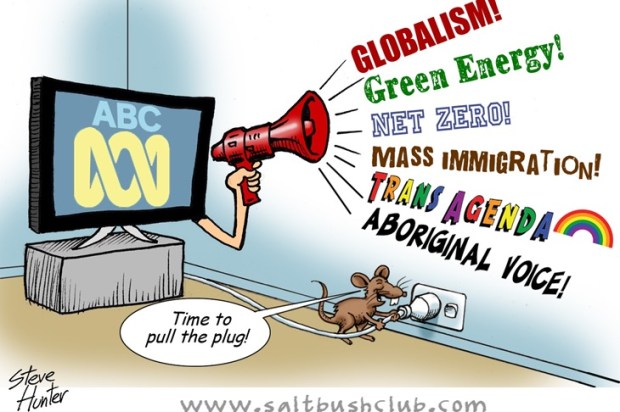On last week’s Q&A, comedian turned mature age law student Corinne Grant shed light on perhaps the most compelling reason why 18c of the Racial Discrimination Act must be repealed: free speech is too important to be left in the hands of courtrooms and self-regarding elites.
According to Grant, we should have no qualms that four students have spent years facing down a six figure law suit that could end with the Federal Court labelling them racists for criticising their university’s racially segregated computer labs.
Why? Because “the legal system exists for a reason and part of that reason is for these debates to be able to be had in an open court with an impartial judicial officer weighing up the pros and cons.”
These words are either coy or wilfully ignorant. The whole point of repealing 18C is that so-called ‘impartial judicial officers’ have a terrible record when it comes to upholding free speech.
The assumption behind Grant’s view is that the questions raised by 18c have a legally correct answer. This buys into the fallacy that what is ‘reasonably likely to offend or insult ‘someone on the basis of race can be objectively discerned concept by the finely tuned moral compass of an ex lawyer appointed to the Federal Court.
One of the time-tested truisms of politics is that disagreement often ends in someone feeling offended. The risk of offence is greatest when opinions are strong and emotions are running high. It should shock no one that such tensions are often worst on issues of race and culture.
Consider the sharp difference in how politicians, media types and ordinary people talk about the issue of Islamic extremism. On one hand, there are those who believe that the teachings of Islam make its adherents more susceptible to violent extremism than Buddhists or Mormons. On the other, there are some convinced that Muslims are driven to radicalism by the prejudice they face in western countries as well as decades of military intervention in the Middle East.
Is it possible that Muslims in the latter category might be offended by a remark suggesting that Islam sometimes foments an anti-western grievance complex that drives them into the arms of murderous Jihadists? And if they are, does that mean they should be able to drag the person behind the view through years worth of court action, bleeding their finances and sullying their character beyond repair?
What about the upcoming referendum on indigenous recognition in the Constitution? If the QUT case is any indication, it appears conceivable that anti-recognise campaigners could be brought before the courts for arguing, as Andrew Bolt does, that indigenous recognition racistly divides Australia and seeks to redress historical disadvantage by enshrining minority privilege. Irrespective of whether you agree with this stance or not, it is an opinion sincerely held by at least thousands Australians. Why let it be silenced by the law?
There is no way these kinds of thorny issues can be debated frankly without the risk that not everyone will leave with their feelings fully intact.
Whether you think criticising Islamic immigration or calling for an end indigenous only safe spaces is ‘reasonably offensive’ under 18c is essentially a value judgment. Answering it requires one to draw upon their values, morals and own unique life experience. Setting the question down in statute doesn’t change the fact that what is offensive in any given situation has more to do with social mores and common sense than legal reasoning.
As a law student myself, I can’t think of a group I’d less prefer to impose their own moral code on what counts as offensive than a group ex-lawyers appointed to the Federal Court.
Besides, the pretence that 18c imports an objective standard of law is debunked by Justice Bromberg’s reasoning in the infamous Andrew Bolt case. His Honour’s judgment calls for an ‘objective assessment of the likely reaction… of a member of the people concerned and the values and circumstances of those people’ when determining if 18C has been breached.
The result is a courtroom calculation of how a ‘reasonable’ member of a particular racial identity group would respond to an allegedly offensive comment. In effect, judges are expected to adopt the mindset of another race and guess based on their presumed cultural sensitivity how much offence they could reasonably withstand.
It’s quite possible this approach could result in a stream of precedents suggesting different ethnic and religious groups have varying thresholds when it comes to what is reasonably likely to offend. The contrast in public reaction between David Leyonhjelm’s complaint against Fairfax after he was labelled an ‘angry white male’ and the brouhaha surrounding Bill Leak’s controversial cartoon depicting a deadbeat indigenous father suggests a double standard is already at play. Whereas the Human Rights Commission denounced Leak’s cartoon as racist, media types were stunned at the thought that a white male could be ‘reasonably offended’ by Mark Kenny’s jibe about ‘angry-white-male certitude.’
By resegregating society into a collection of race based victim groups, 18c turns its back on the seminal triumph of twentieth century liberalism; the primacy of the individual before the law; regardless of racial or ethnic background.
Another misconception recited to much applause on Monday’s Q&A is that 18c helps support a ‘cohesive, multicultural society.’ This belief that supporting 18c makes you a friend of minority groups is a meaningless cliché. Rather, the real question is whether you think judges should decide if robust commentary made in the cut and thrust of public debate should be legally sanctioned if it involves race. Put differently, in order to support 18c, you have to believe that judges – who by the way, happen to be predominantly old, white men – have a firmer grasp on what’s reasonably offensive than civil society.
Another cost overlooked by Grant’s blind faith in the legal system is the financial and emotional toll that comes with litigation. It is standard practice in legal disputes to use the threat of litigation to exact a favourable settlement from a reluctant adversary. Indeed, there are good reasons why most of the time people settle rather than risk years in court and financial ruin. This is why it’s in everybody’s interests to repeal laws like 18c that allow busybodies to make hay by threatening vexatious lawsuits. That a handful of students originally included in the QUT case chose to settle for thousands of dollars instead of facing the ignominy of a drawn out court battle is no small testament to this.
Still, it’s not hard to see why Corrine Grant and her ilk are attracted to the idea of trusting judges to umpire public debate. In their world, the key to solving racism is handing more power to elites like the race gurus at the Human Rights Commission who can impose their own enlightened virtue onto the will of the unwashed masses.
If we really want to cultivate a society that embraces racial difference, empowering the legal system to arbitrate hurt feelings won’t get us very far. Instead, we should focus on fostering a society where racism is shot down by the decency and rectitude of ordinary people. On that score, repealing 18c would be an auspicious place to start.
John Slater is the Executive Director of the H.R. Nicholls Society.
Got something to add? Join the discussion and comment below.
Get 10 issues for just $10
Subscribe to The Spectator Australia today for the next 10 magazine issues, plus full online access, for just $10.

























Comments
Don't miss out
Join the conversation with other Spectator Australia readers. Subscribe to leave a comment.
SUBSCRIBEAlready a subscriber? Log in